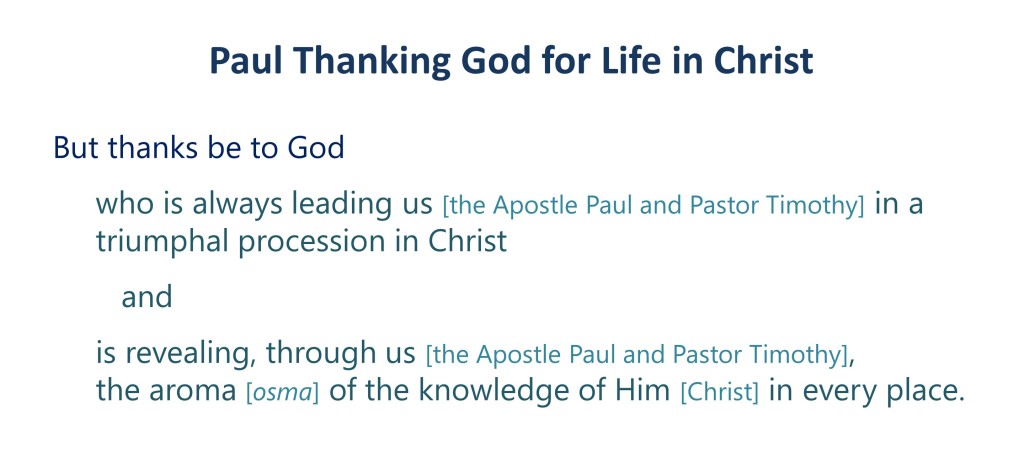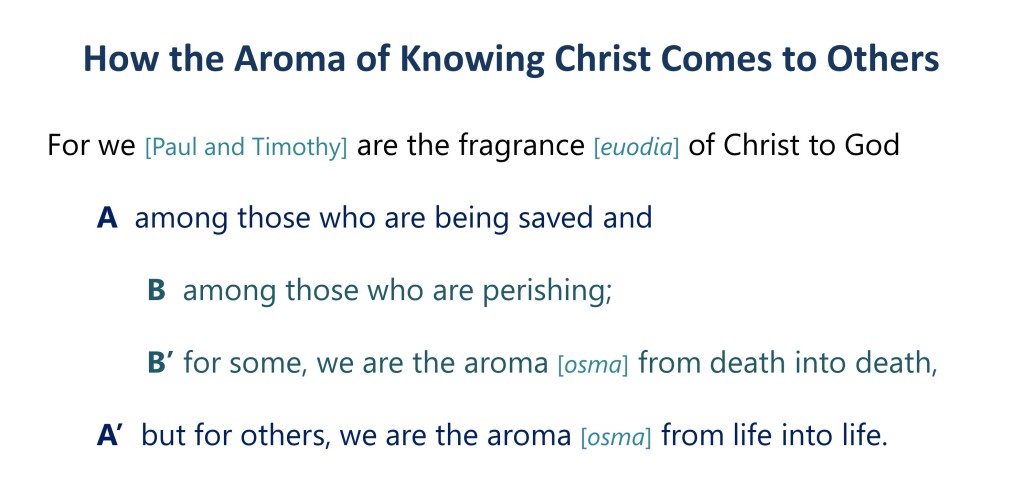 Last week, we explored Paul and Timothy’s use of a chiasm to mention that God seals and anoints His people in the New Covenant. We explored that and saw that such sealing and anointing was what the Church later came to call “confirmation.”
Last week, we explored Paul and Timothy’s use of a chiasm to mention that God seals and anoints His people in the New Covenant. We explored that and saw that such sealing and anointing was what the Church later came to call “confirmation.”
Explanation for 2 Corinthians
Paul earlier explained why he and Timothy wrote 2 Corinthians (1 12-14) and why he hadn’t visited them (1:15-17), which led to the theological statement that he and Timothy aligned themselves with the “yes” of Jesus (1:18-22). Paul now revisits why he didn’t come to visit them as he had promised.
Read 2 Corinthians 1:23-2:4
- Why did Paul choose not to visit the Corinthian congregation?
- Paul uses Old-Testament language about God knowing what is true, even if no one else knows (Genesis 31:50; 1 Samuel 12:5-6, 20:42; Judges 11:10). What does he hope that will accomplish?
- Remembering what took place between 1 Corinthians and Paul’s “letter of tears,” why do you think Paul would include Timothy when he said, “Not that we lord it over your faith”?
- How did the Corinthians react to Paul’s earlier letter (now lost, his third letter to Corinth), which was not what he had intended?
Forgive and Restore the Offender
Read 2 Corinthians 2:5-8
Nearly all the early fathers of the Church identified the offender mentioned here as the man who had sexual relations with his mother, mentioned in 1 Corinthians 5:1-6.
- When the Corinthian congregation finally excommunicated the offender, what were they slow to do after he repented?
- What did this lead to?
- How should the Corinthian congregation be treating him? (vs. 7)
Read 2 Corinthians 2:9
- Discuss: “Lord it over you” (1 Corinthians 1:24) with Paul’s statement that he wanted to see if the Corinthian congregation was “obedient in everything.”
“obedient”: Apart from this verse, Paul only used the adjective “obedient” (hypekoos) to refer to Christ (Philippians 2:8). When Paul used the verb “obey” (hypakouo) or the noun “obedience” (hypakoe), he referred to:
- Christ’s obedience to God (Romans 5:19) or
- the Christian’s obedience to:
- God (Romans 6:12-16, Philippians 2:12),
- Christ (2 Corinthians 10:5-6),
- or the gospel/faith (Romans 1:5, 10:16, 15:18, and 16:26).
In every case, it is obedience to God and following the faith. For Paul and Timothy then to “lord it over” the congregation would be for them to act in such a way as if they were the Lord instead of faithfully doing what the Lord had given them to do.
When Paul and Timothy were doing what God had given them to do, the congregation was to obey them “in everything.” If Paul and Timothy “lording it over them,” as if they were the source and authority of what they did, the congregation was not to obey them.
Read 2 Corinthians 9:10-11
- What is the purpose of bringing Christ’s forgiveness to another?
- Can improperly applying Christ’s forgiveness to another assist Satan?
- How does someone improperly apply Christ’s forgiveness to another?
The Change in Travel Plans
Read 2 Corinthians 2:12-13
- Whom was Paul expecting to meet in Troas?
- Because he did not meet him there, where then did Paul travel?
Pastor’s wooden translation of 2 Corinthians 2:12-13:
But coming into Troas in the Gospel of Christ, and a door being opened to me in the Lord, and not having any rest in my spirit, not to find Titus, my brother; but leaving them, I went into Macedonia.
From our translations, we can easily conclude that the Lord opened the “door” for Paul to be in Troas. But since Paul didn’t find Titus there, he chose to go to Macedonia. That’s not what Paul is saying; instead, he sees all of what he describes as the Lord opening the door for him.
Law and Gospel in the Life of the Church
Read 2 Corinthians 2:14-16a
Paul arranges this section in a couple of different ways to emphasize what He is saying. To help us understand this better, we look at what Paul says, using a couple of different graphics.
Paul thanks God for two reasons:
- In Christ, God leads us [Paul and Timothy] in a triumphal procession, and
- God reveals the knowledge of Christ through us [Paul and Timothy] in every place.
Paul is not saying that all Christians don’t get to be part of the triumphal procession in Christ. What he is saying is that he and Timothy changed their travel plans, which was God’s doing (leading us). Paul and Timothy would spread the aroma of Christ somewhere else; thus, Paul’s saying “in every place.”
Notice that Paul emphasizes that God is the doer for what takes place in His Church. But Paul also explains how God chooses to do what He does: through His pastors. And what God is doing is constant, for Paul used present-tense participles to show this: God is leading… God is revealing.
What God is doing in His Church has both a time dimension and spatial dimension. God is always (time) leading His people and He is revealing the knowledge of Christ in every place (spatial).
Paul now further develops what God is doing through him and Timothy.
In the New Testament, besides here, only Paul or Paul and Timothy use osma and eudoia together in such a way (Ephesians 5:2 and Philippians 4:18). Here, they emphasize that they are the fragrance and aroma of Christ, through whom God works to others into life.
However, in Philippians 4:18, we learn that the congregation at Philippi was “a fragrant aroma [to Paul], a sacrifice acceptable and pleasing to God.” Thus, we learn that all Christians are also to be the aroma of Christ to others, each according to how God has placed him to serve.
But notice that God is the receiver of the fragrance and aroma. In the Old Covenant, those words described the pleasing aroma of a sacrifice to God (Genesis 8:21, Exodus 29:18, Leviticus 1:9, and Numbers 15:3), pointing forward and linking to what Jesus as the Messiah would do. In the New Covenant, Jesus the Messiah is the pleasing aroma to God!
Pastors bring the aroma that is pleasing to God, Christ, to God’s people. They do that by what they preach [Jesus] and through the Sacraments, specifically the Lord’s Supper, where Jesus in His body and blood are delivered to God’s people. Christians, however, also bring Christ to others as they serve in their daily vocations.
- What two types of “aromas” (A and B in the chiasm) do Paul and Timothy deliver?
- What purpose does delivering the aroma of death serve?
- Although the aroma of death is in the center of the chiasm (the chiasm’s central point, but not the only point), it is a subordinate clause to the first statement (shown in the first graphic). What then is the ultimate purpose of a pastor bringing the aroma of death to another?
In Himself, No One is Qualified to be a Pastor
Read 2 Corinthians 2:16b-17
- What are “these things” that Paul’s references?
- What is Paul’s implication when he says, “Who is sufficient for these things?”
- If no one is sufficient, then how does someone become sufficient to be a “minister (pastor) of a new covenant”? (2 Corinthians 2:17, 3:5-6)
“commissioned by God”: Here, the ESV takes some liberty. It’s not that Paul and Timothy were simply commissioned by God to do what they were doing; what they were doing originated from God.
Next week, Paul and Timothy will expound on what it means that they are “ministers of a new covenant”?
Click here to go to the next Lesson.



